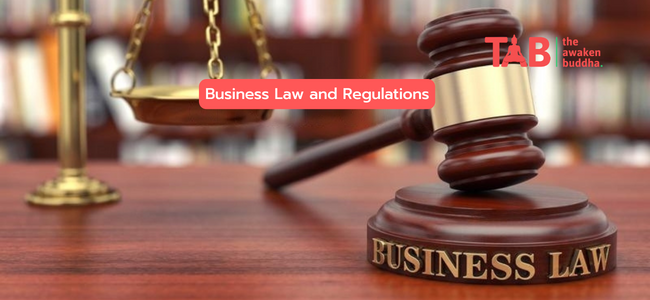As a business owner, understanding the legal framework that governs business activities is essential to ensure compliance and avoid legal issues. Business law and regulations encompass various legal principles and rules that regulate business transactions, contracts, employment, intellectual property, and other business activities.
This report will provide a comprehensive guide to business law and regulations, covering the fundamental principles, key regulations, and best practices businesses need to know to operate legally and efficiently.
Table of Contents

1. What are Business Laws and Regulations?
2. The Importance of Business Law and Regulations
3. Types of Business Entities
4. Legal Requirements for Starting a Business
5. Contracts and Agreements
6. Intellectual Property Law
7. Employment Law and Regulations
8. Tax Law and Regulations
9. Environmental Law and Regulations
10. Antitrust and Competition Law
11. Consumer Protection Law
12. Cybersecurity and Data Privacy Law
13. International Business Law
1. What are Business Laws and Regulations?
Business law and regulations refer to the legal rules and principles governing business formation, operation, and dissolution. These laws cover various business activities, including contracts, employment, intellectual property, tax, environmental, and antitrust issues. Business law also regulates the relationships between businesses and their stakeholders, including customers, suppliers, employees, and shareholders.
Business law is a complex field that draws from various legal disciplines, such as contract law, tort law, property law, and commercial law. Business owners need to understand the legal framework that governs their operations to avoid legal issues and ensure compliance with the law.
2. The Importance of Business Law and Regulations

Business laws and regulations are critical in ensuring fair competition, protecting consumers and employees, and promoting economic growth. They also provide a legal framework for resolving disputes between businesses and their stakeholders, protecting intellectual property rights, and regulating business transactions and contracts.
Compliance with business law and regulations is essential for businesses to operate legally and avoid costly legal issues that can harm their reputation, financial stability, and growth prospects. Non-compliance with legal requirements can result in fines, penalties, and legal liability, significantly impacting a business’s operations and bottom line.
3. Types of Business Entities
Before beginning a business, it is essential to understand the various types of business entities and their legal implications. The most common kinds of business entities include:
- Sole proprietorship: a business owned and managed by a single individual personally liable for the business’s debts and obligations.
- Partnership: a business owned and managed by two or more people who share gains and losses and are jointly liable for the business’s debts and obligations.
- Limited liability company (LLC): a hybrid business entity that supplies limited liability protection to its owners while allowing them to enjoy the tax benefits of a partnership.
- Corporation: a separate legal entity that provides limited liability defense to its shareholders and allows for easy transfer of ownership and raising capital.
4. Legal Requirements for Starting a Business
Starting a business involves complying with various legal requirements, including:
- Registering the business with the state and obtaining a business license.
- Obtaining necessary access and licenses to operate the business.
- Registering for state and federal taxes and obtaining an employer identification number (EIN).
- Complying with labor and employment laws, such as minimum wage, worker’s compensation insurance, and anti-discrimination laws.
- Creating contracts and agreements with suppliers, customers, and employees.
5. Contracts and Agreements
Contracts and agreements are critical to business operations, establishing legally binding obligations between parties. Some common types of contracts include sales, employment, lease, and non-disclosure agreements.
Ensuring that contracts and agreements are well-drafted, clear, and unambiguous is essential to avoid legal disputes and minimize legal liability. It is also important to thoroughly understand the legal requirements for creating and enforcing contracts, including the requirements for offer, acceptance, consideration, and capacity.
6. Intellectual Property Law
Intellectual property (IP) law protects creative works, inventions, and other forms of intellectual property. IP law includes trademarks, patents, copyrights, and trade secrets. Businesses must protect their intellectual property rights to prevent others from using, copying, or stealing their creative works or inventions.
It is also essential to ensure that businesses do not infringe on the IP rights of others, as this can result in legal liability and financial damages.
7. Employment Law and Regulations
Employment law and regulations cover the legal relationship between employers and employees, including issues such as minimum wage, worker’s compensation, anti-discrimination laws, and employee benefits. Employers must comply with these laws to avoid legal issues and protect the rights of their employees.
It is essential to thoroughly understand the legal requirements for hiring and firing employees, creating employment contracts, and complying with labor laws to ensure a smooth and legal employment relationship.
8. Tax Law and Regulations
Tax laws and regulations cover the legal requirements for businesses to pay taxes, including federal, state, and local taxes. Businesses must comply with these laws to avoid legal issues and financial penalties.
Understanding the legal requirements for filing taxes, maintaining proper records, and complying with tax laws is essential to ensure a smooth and legal tax compliance process.
9. Environmental Law and Regulations
Environmental laws and regulations cover the legal requirements for businesses to protect the environment, including issues such as air and water pollution, hazardous waste disposal, and climate change. Businesses must comply with these laws to avoid legal issues and protect the environment.
Understanding the legal requirements for environmental compliance, including obtaining permits and complying with environmental regulations, is essential to ensure a smooth legal compliance process.
10. Antitrust and Competition Law
Antitrust and competition law cover the legal requirements for promoting fair competition and preventing anti-competitive practices, such as price-fixing, market allocation, and monopolization. Businesses must comply with these laws to avoid legal issues and promote fair competition.
It is essential to thoroughly understand the legal requirements for antitrust compliance, including avoiding anti-competitive practices and complying with antitrust regulations to ensure a smooth and legal competition compliance process.
11. Consumer Protection Law
Consumer protection law covers the legal requirements for protecting consumers from unfair and deceptive practices, such as false advertising, fraud, and product defects. Businesses must comply with these laws to avoid legal issues and protect the rights of their customers.
It is essential to understand the legal requirements for consumer protection, including complying with consumer protection regulations and avoiding deceptive practices to ensure a smooth and legal consumer protection compliance process.
12. Cybersecurity and Data Privacy Law
Cybersecurity and data privacy law covers the legal requirements for protecting sensitive information, such as personal and financial information, from unauthorized access, theft, and misuse. Businesses must comply with these laws to avoid legal issues and protect the privacy of their customers and employees.
Understanding the legal requirements for cybersecurity and data privacy, including complying with data protection regulations and implementing cybersecurity measures to ensure a smooth and legal cybersecurity and data privacy compliance process.
13. International Business Law
International business law covers the legal requirements for conducting business across international borders, including cross-border contracts, intellectual property protection, and international trade regulations.
Conclusion
Business law and regulations are essential to running a successful and legally compliant business. It is essential to thoroughly understand various business operations’ legal requirements and regulations, including contracts, intellectual property, employment, taxes, environment, competition, consumer protection, cybersecurity, and international business.
FAQs
1. Why is it essential for businesses to comply with business laws and regulations?
Businesses must comply with business laws and regulations to avoid legal issues, protect their rights and interests, and create a positive reputation for their brand.
2. What are some common types of contracts that businesses use?
Common types of contracts businesses use include sales, employment, lease, and non-disclosure agreements.
3. What is intellectual property law?
Intellectual property law protects creative works, inventions, and other forms of intellectual property. IP law includes trademarks, patents, copyrights, and trade secrets.
4. What are some examples of employment laws and regulations?
Examples of employment laws and regulations include the minimum wage, worker’s compensation, anti-discrimination laws, and employee benefits.
5. What is consumer protection law?
Consumer protection law covers the legal requirements for protecting consumers from unfair and deceptive practices, such as false advertising, fraud, and product defects.









